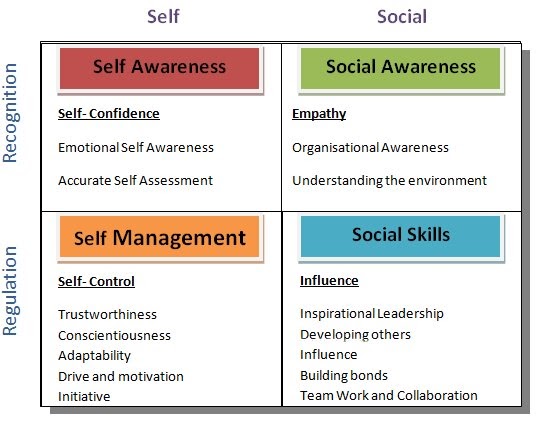-
25 Nov 2020
GS Paper 4
Theoretical Questions
What do you understand by emotional intelligence? Discuss, with suitable examples, how it can be useful in better governance. (150 words)
- Define Emotional Intelligence (EI).
- Mention the significance of EI in the conduct of civil servants.
- Conclude by mentioning about the dynamic nature of civil services in ensuring effective governance.
Introduction
Emotional Intelligence is about knowing and understanding not only one’s own emotions but also others emotions and then behaving and regulating one’s own emotions in a socially desirable way.
Daniel Goleman has given a model of EI consisting of four components:
Body
Application of EI in administration and governance:
- Since the administration has a role of translating public policy into action, civil servants become intermediaries between government and citizens and hence, there is a two way relationship.
- Work of civil servants has involvement of emotions; therefore emotional management is essential for ethical conduct.
Civil servants face several challenges in managing their relations effectively. EI can be used by the civil servants for better governance in the following aspects:
Intra-organization relations:
- Adopting suitable behavior with superiors as well as subordinates.
- Giving due consideration to genuine concerns of personnel while handling transfers, promotions, rewards and recognitions with due priority to merit and technical competence.
- Ensuring conducive work culture in the organization.
- For ex: ISRO is known not only for its technical competence but also as an organization which is outcome oriented, change oriented and seen as pride of the nation.
- It is also known for ensuring a friendly work environment for female employees during pregnancy.
Administration-citizen interface:
- Ensuring neutrality, efficiency as well as compassion, citizen-friendliness, involvement and association with the citizens in public service delivery.
- Civil servants need not just adhere to their duty, responsibility, and commitment as per conduct rules but also require having emotional, social and ethical competence.
- For ex: giving priority to women, senior citizens, differently-abled in any welfare scheme thereby ensuring administrative justice and good governance.
- Work of former IAS officer Shri O P Chaudhary in establishing an Education City in Dantewada district, Chattisgarh was made possible only by winning the confidence of the tribals.
Solving societal problems:
- Need to have leadership, innovativeness, and responsible behavior while addressing challenges of a diverse society like casteism, communalism, regionalism, etc.
- Due importance should be given to humanism, compassion and rational decision making in handling situations like riots, law and order situations, criminal justice system, prison reforms, etc.
- Rtd. IPS Ms. Kiran Bedi as Inspector General of Tihar jail worked to reform the prison into a model jail where prisoners learn new life skills and later merge with the mainstream.
Conclusion
Present day dynamic civil services require officers to have soft skills including leadership, empathy and innovation. Effective governance can be made possible only by ‘pro-people, pro-active bureaucracy’. Hence, civil servants with emotional intelligence have understanding about their duty, responsibility and commitment.





